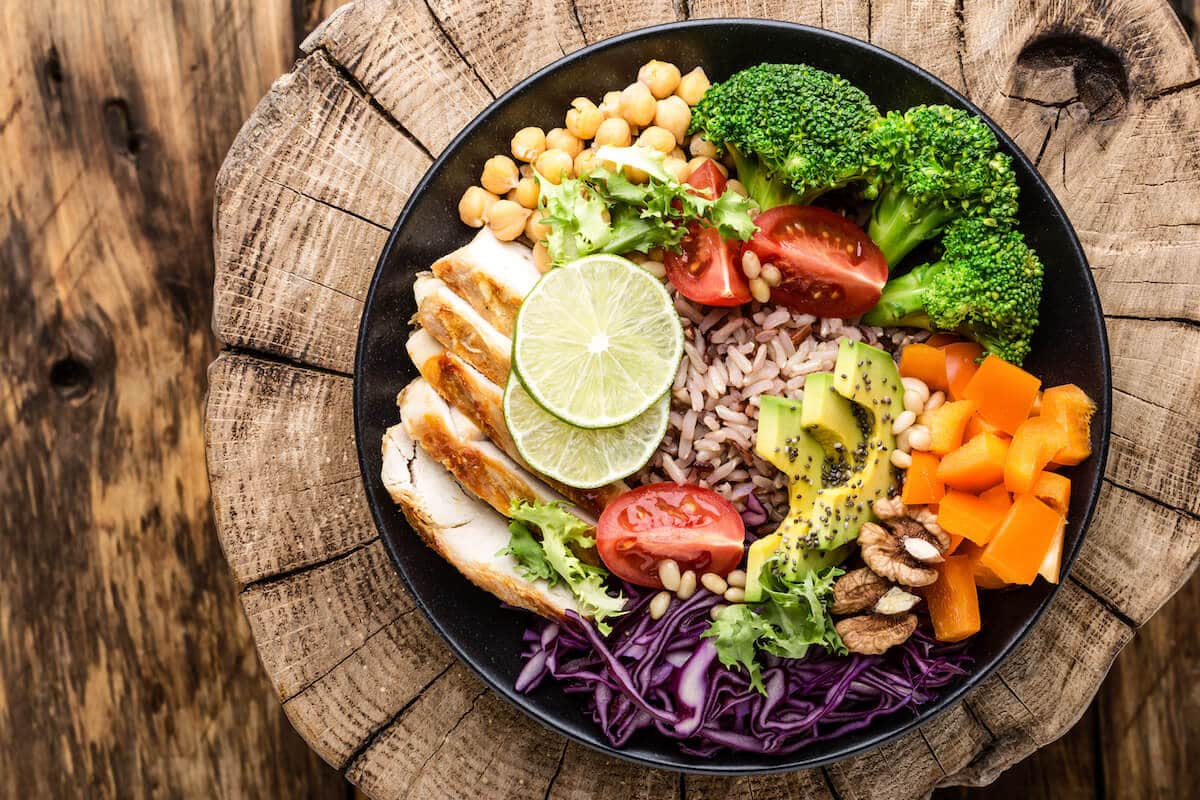
28 Sep How Much Protein Can Your Body Absorb? Does It Matter?
Although we all need protein, the question “How much protein can your body absorb?” is of particular concern if you’re very physically active. And for good reason — all that activity uses up a lot of protein.
You may also be interested in increasing your protein absorption if you’re an older adult beginning to lose muscle mass or if you’re managing your weight or body composition.
Let’s take a look at why you need protein, how much of it your body can absorb, and how to choose the best proteins to maximize absorption so you can optimize your health and performance.
Why You Need Protein
Protein is one of the three macronutrients — protein, carbohydrates, and fats — that you need to survive. Your body uses protein for many different functions, including creating your bones, organs, and muscles, as well as your eyes, skin, hair, and nails. Protein is also necessary to produce hormones and enzymes, keep your immune system strong, and carry out many chemical reactions in your body.
Most importantly, especially if you’re an athlete or bodybuilder, your protein consumption needs to be high enough to fuel your intense level of activity and to build and repair the muscle that works so hard for you.
To make protein, you need to consume protein and then absorb it. That’s where we need to clarify a few things to answer the question, “How much protein can your body absorb?”
How Protein Is Used in Your Body
When you consume dietary protein, your digestive system breaks it down into amino acids. Depending on the bioavailability of those amino acids, a certain percentage of them are absorbed from the small intestine through cells in the intestinal wall into the blood. This is known as protein absorption. The blood then carries the amino acids to where they are needed in the body.
Those amino acids — and particularly the branched-chain amino acids leucine, isoleucine, and valine — are recombined in different combinations through a process known as protein synthesis. The new proteins are then used to build or repair skeletal muscle or other parts of your body, give you energy, or perform any of the other functions of protein.
How Many Grams of Protein You Need to Build Muscle
The amount of protein you need depends on many factors, including your age, health, activity level, and personal goals.
As an average, moderately active person, the recommended dietary allowance (RDA) is 0.8 grams of protein per kilogram of body weight every day. However, if you’re starting to lose muscle mass due to age-related sarcopenia, you may need up to 1.5 grams per kilogram. And if you’re extremely active or focused on building and maintaining muscle, you may need at least 2 grams of protein per kilogram each day, with endurance athletes requiring even more.
What Happens if Your Protein Intake Isn’t High Enough?
Your body is designed to store extra fuel in your muscles in the form of glycogen. If you’re involved in high-intensity exercise, restricting calories, or not eating enough carbs — and as a result don’t have the resources available to produce the energy you need — your body starts to break down your muscle to access that glycogen. The glycogen is broken down into its component glucose molecules and released into the bloodstream to be used as fuel.
As an athlete or bodybuilder, simply someone who cares about their health or body composition, the last thing you want is to lose muscle mass and therefore strength. So you need to make sure your amino acid pool is full enough so your body can easily access the energy it needs when it runs low — and that means getting enough protein. However, consuming a large quantity of protein in one sitting may not be the answer.
How Much Protein Can Your Body Absorb Per Meal?
You can eat as much protein as you like at each meal but that won’t change your absorption rate. Some research indicates that there’s only so much your body can absorb and use for muscle building at one time — any extra will be used elsewhere in your body or simply excreted.
The research is ongoing but according to one study on how protein and resistance training affect gains in muscle mass in young men, the optimal quantity of protein that’s required for muscle protein synthesis is about 0.25 grams per kilogram of body weight in one sitting — that’s over about 1.5 to two hours.
Taking variations between individuals into account, the study suggests an amount of 0.4 grams of high-quality protein per kilogram of your body weight per meal. With four meals per day, that will give you a total of 1.6 grams per kilogram for the day. Bodybuilders and extreme athletes might need to aim for a higher protein target of 2.2 grams per kilogram per day or 0.55 grams per kilogram at each of four meals.
What Happens if You Eat More Protein Than the Recommended Amount?
If you’re eating a very high-protein diet, although any excess protein is unlikely to boost your muscle growth further, your body may use it for other functions like maintaining your energy levels or repairing other tissues, depending on what your body needs at the time.
It’s also interesting to note that if you eat a lot of protein at a single meal, your body slows down intestinal contractions to allow time for more of the protein to be absorbed. This suggests that whether you eat your protein all at once or spaced over several meals might not be as important as some other studies indicate.
This is also backed up by research that indicates that intermittent fasting — which involves restricting your feeding window to a certain number of hours a day — doesn’t seem to negatively affect protein metabolism.
So how much protein can your body absorb? The answer isn’t that simple and more research is required.
Where to Get Protein

As we’ve seen, the basic building blocks of protein are amino acids. Some amino acids can only come from the nutrients you consume — these are known as essential amino acids (EAAs). Your body can make the others you need, which are known as non-essential amino acids.
Protein is found in many different whole foods. Animal protein sources are usually complete proteins, meaning they contain all nine of the EAAs. Beef, chicken, fish, eggs, and dairy products are all examples of high-quality, complete proteins that will give you the amino acids you need.
Some plant proteins are also complete proteins, such as soybeans, quinoa, and hemp. But it’s worth noting that they don’t contain the same high levels of EAAs as animal proteins, so you may need to eat more of them.
Many plant proteins are incomplete, like beans, lentils, nuts, vegetables, grains, and seeds. Since they don’t provide all of the EAAs, you need to eat them with other proteins to make sure you get the nutrients you need. For example, beans or lentils can be combined with grains like brown rice, peanut butter works well with whole-grain bread, or you can add seeds and nuts to your salad.
Protein From Supplements
If you’re training intensively, there’s a good chance you may not be able to get enough protein from whole foods, even with high-protein meals, to meet your protein requirements. Even if you aren’t training, increasing your protein intake can give your general health and well-being a boost and help you thrive — instead of simply survive — during a busy day. In either case, supplementation is an easy and convenient way to get the extra protein you need.
Depending on your specific needs, you may choose a dairy-based protein like whey protein concentrate or isolate, or casein.
To maximize absorption, look for high-quality whey protein supplements like Performix ioWhey Protein. This contains Ingredient Optimized ioWhey Protein, which has been proven to be more bioavailable than non-optimized whey protein.
If you’re vegetarian or vegan, or you can’t tolerate dairy products, a plant-based protein like Performix ioPlant or Kaged Muscle Plantein might be a better choice for you.
Choose Your Protein Supplement According to Your Needs

All protein needs to be digested before it can be absorbed and proteins digest at different rates. If you want a quick boost from protein, choose a fast-digesting one that will be absorbed fast and therefore quickly available to your body. The fastest-digesting proteins are usually protein powders that are lower in fiber and fat — both of which can slow the process down.
For example:
- Whey protein consumed on its own is absorbed at about 8 to 10 grams per hour, so 20 grams of whey protein taken just pre- or post-workout will be available to your body within two hours, but only for about 90 minutes.
- On the other hand, casein digests much more slowly at only 6.1 grams per hour. However, while the amino acids are released more gradually, they are available for 4 to 5 hours, which is why casein is often taken before bed so it can work overnight.
- Of the plant-based proteins, pea protein is absorbed the fastest. With the latest advances in technology, products like Ingredient Optimized ioPea Protein have been proved to be just as bioavailable as whey protein and are well worth considering.
How to Maximize Protein Absorption
As we’ve discussed, before your body can absorb any protein at all it first needs to digest it. So whatever you can do to improve your digestion will also help to improve protein absorption — assuming what you’re consuming is reasonably bioavailable.
Try these tips:
- Eat smaller meals throughout the day and make sure you include protein in each one.
- While you’re enjoying your meal, chew each mouthful well to break down your food and make it easier to digest.
- Eat at least some of your food raw or only lightly cooked to preserve the enzymes that help your body access the amino acids in your meal.
- Drink your protein rather than eating it. Liquids digest faster than solids and will then be more quickly absorbed (if speed is what you want). Try mixing your protein powder into a protein shake or smoothie.
- Drink enough water as digesting protein requires extra water.
Beyond that, choose products that have been independently tested and proven to be highly bioavailable and therefore very effectively absorbed.
Note: If you have a medical condition of any kind, especially reduced kidney function, consult a registered dietitian or nutritionist before adding more protein to your diet.
How Much Protein Can Your Body Absorb?
The answer to the question “How much protein can your body absorb?” isn’t as simple as it sounds. Some of the latest research indicates that how much your body can absorb at once may not be as important as making sure you get enough protein over the course of a day. The bottom line is that you want to keep your body fueled and your muscles and other tissues in the best possible shape.
The answer may lie instead in what’s right for you. Experiment with different amounts of protein per meal and a variety of feeding windows to see what works best for your particular circumstances. You’ll know when you hit your sweet spot — your performance will peak and you’ll feel fantastic.


